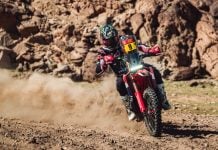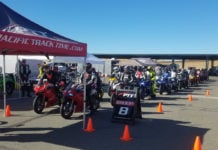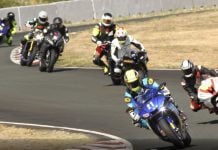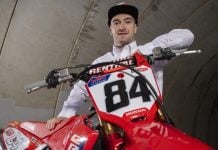Ivan Debord started racing in his native Dominican Republic on 50cc scooters, trying desperately to hide his activities from his parents, who wanted him to grow up to be a white-collar professional. That part didn’t work out exactly as his folks had wanted. Today, Debord is an apartment building superintendent in the Bronx. But the racing thing–that’s worked out very, very well. Having survived his trial by fire in the underground street racing scene in New York, Debord, 36, of New York, bagged three CCS class titles last season. Racing a Suzuki GSX-R1000, Debord won the Grand Prix Unlimited Championship and the SuperSport Unlimited Championship in the CCS New Jersey Motorsports Park track series. He backed that up with the Grand Prix Unlimited Championship in the CCS Atlantic Region. Debord has come a long way from racing scooters. “Crazy story,” Debord says. “My parents never wanted me to get near motorcycles. So it was a little bit of a challenge to hang out with the guys who fixed and repaired scooters. That’s how I got my start–racing 50cc scooters. I was about 10. I was a very good student, and the parents from my country–they want their kids to be a doctor or a lawyer or something like that. But I have a passion for the bikes since I was three, four, five years old, something like that.” Debord says he won a few races on the scooters and the 50cc Stock Championshop. But his mind was focused on big, powerful bikes from the very start. His neighbor’s Honda CB750 made sure of that. “When I heard that bike coming towards the neighborhood, I would run out onto my front porch and say, ‘One day I’m gonna have one of those right there.’ It was always in my head,” Debord says. Debord came to the U.S. in 1993, and quickly fell in with the street racing scene in New York. “I used to street race a lot–these guys they always used to spend a lot of money. I remember the last time I raced, the bet was $25,000! I didn’t know any better. I just wanted to be around the motorcycle scene. It was a dream to me,” he says. Debord had started hanging out with one group of guys who owned and worked on a Honda CBR600F3. Their rivals were another group of knuckleheads who were doing the same thing. Then, late at night, the two bikes would square off for a mile-long, late night dash through New York, with thousands of dollars at stake. “This turned into kind of a battle. I always rode an F3. They keep buying parts for it and trying to modify the bike and get it to go faster. The other group had a ZX-6 Kawasaki. Those were the two bikes that were always going at it. All the guys would start chipping in (for the bet), they would be saying, put me in for $200, put me in for $500, and then there would be $5000, $6000 on the race. “One day, one of these guys says, ‘If I put you on my bike, will you race it?’ and I said, ‘Yeah! But I’m not responsible if I lose!’ and he said, ‘No, no, no, don’t worry.’ And I lost, so … but he didn’t lose that much, maybe $500,” Debord says. “It was on what they call the Henry Hudson Parkway. It started at a street they call Dyckman Street. You line up about five or six cars blocking the highway. And you go all the way down to the George Washington Bridge–that’s the finish line. Everybody except the guys that would block the highway, they parked on the side of the highway and they’d see the bikes coming up to the finish.” Eventually, the police put an end to the insanity by installing a video camera on a nearby toll booth and every time the bikes would roll up, traffic officers would roll out to the scene. But by then, Debord was headed to the track–New Hampshire Motor Speedway, to be precise. “One of the guys who came to the races, he was always a quiet guy, and one day he approached me and he said, ‘You seem like you can ride. I want to take you to the track. You ever been to the track?’” I said, ‘No, but I would love to. I will pay you to take me. That was my shot.’” Debord’s friend was classified as an LRRS Junior, and he loaned Debord a bike and a suit. Debord went through the Penguin Racing School and graduated–“I came back so happy. That was it. That was the start,” he says. A couple years later, Debord had scraped together enough for a stock Honda CBR600F4i. He put a racing upper fairing and tailsection on the bike–the rules didn’t require a belly pan, so he didn’t put one on. He bought a set of take offs for $50. And that’s how he started his racing career… Which nearly ended almost immediately. At a race at New Hampshire, Debord entered the track incorrectly, joined up with a group already on the track, then ignored the meatball flag for “like 20 laps,” he says. Race officials were not pleased. They yanked his license, forced him to re-take the New Racer school and warned him that they’d be keeping a very, very close eye on him. “Jerry Wood–he just went off on me. He was using all kinds of words. He was really mad–he was all red,” Debord recalls. Debord raced sporadically for the next few years, riding a mostly stock motorcycle. For 2011, though, Debord hooked up with a performance shop called Primoto. They put a real racebike underneath him. And Debord went to the front, finishing in the podium positions in CCS Atlantic and CCS/NJMP competition. The 2012 season saw him go one better, but it wasn’t without its trials. At a race at Summit Point, he says, a competitor protested his brakes. Debord says the rulebook says his class required OEM brake calipers, and he had on his Suzuki, he insisted, OEM brake calipers. Problem was, they were Yamaha OEM calipers. Officials were not impressed by his interpretation of the rules and told him that OEM meant OEM from the bike that he was riding. Debord borrowed a set of Suzuki calipers from someone else, but they were leaking from the bleed valve. His mechanic told him to be careful. Debord said he was going to race the thing like he always raced it. He got away with it for about a half-dozen laps, then he got to the end of the front straight and pulled the brake lever in–and got nothing. “That day, I had the biggest crash ever of my life. It was really ugly. That bike got destroyed completely. And I got zero points that weekend,” he says. But by the end of the season, Debord had the title in three classes, three classes with serious riders on fast machines. It was a long way from racing through the streets of New York, and it had taken a lot to get there. Debord recalls his wife yelling at him because he spent all of his time and money on his race program–and when he pointed out that he was pretty sure he’d taken her to the movies in the recent past, she pulled out the movie ticket stubs that she’d saved. They were years old, and worse, they were to the film “Biker Boyz.” “That movie sucked, too,” Debord says. When he crossed the line and knew he’d won his first Championship, it was an emotional moment, Debord says. “I tell you, that was a big relief. You always tear up a little bit–some tears come out. It’s very hard work, but I did it,” he says. For the 2013 season, Debord will be aboard an Aprilia RSV4, he says. “A lot of things have happened since last year,” he says. “Primoto had to close. Aprilia USA is kind of helping us out this year with New Haven Powersports–we’re kind of working together.” Debord also is backed by Dunlop, eni, Brembo, Vortex, Yoshimura, Absolute Cycle and Technology-R, he says. What hasn’t changed is the passion for motorcycles. Debord says when he travels back to the Dominican Republic, he sees the kids racing the scooters, and he remembers the desire to get on one and race it. “Sometimes, when I go back,” Debord says, “I see them racing and I remember how much fun it was and I find myself thinking, ‘Man, I need to get one and do that again!’”
ATHLETE FEATURE: Ivan Debord
ATHLETE FEATURE: Ivan Debord
© 2013, Roadracing World Publishing, Inc. By Michael Gougis.






